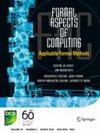非多拷贝原子体系结构的组合推理
IF 1.4
4区 计算机科学
Q3 COMPUTER SCIENCE, SOFTWARE ENGINEERING
引用次数: 3
摘要
依赖/保证推理提供了一种组合方法来推理并发程序。然而,这种推理传统上假设了顺序一致的内存模型,因此在存在数据竞争的现代硬件上是不可靠的。在本文中,我们为非多拷贝原子弱内存模型提供了一种基于依赖/保证的方法,即线程的存储不会同时传播到所有其他线程,因此其他线程无法同时观察到。这些内存模型包括早期版本的ARM处理器和POWER处理器。本文建立在我们对多副本原子体系结构进行组合推理的方法之上,即一个线程的存储同时传播给所有其他线程。在这种情况下,操作语义可以基于线程本地指令重排序。我们利用这一点来提供一种有效的组合证明技术,在这种技术中,弱记忆行为可以显示在顺序一致的记忆模型上保持依赖/保证推理。为了实现这一目标,我们引入了一个侧条件,在每个线程上重新排序干扰自由,减少了对可重新排序指令对进行检查的弱内存的复杂性。在本文中,我们将这种方法扩展到非多拷贝原子弱内存模型。我们利用了平行分量间干涉自由度重排序的思想。这本身会破坏组合性,但可以作为在依赖条件和保证条件之间派生精细兼容性检查的工具,它考虑了仅部分存储(即不覆盖所有线程)传播的影响。我们的方法的所有方面都在Isabelle/HOL中进行了编码和验证。本文章由计算机程序翻译,如有差异,请以英文原文为准。
Compositional Reasoning for Non-multicopy Atomic Architectures
Rely/guarantee reasoning provides a compositional approach to reasoning about concurrent programs. However, such reasoning traditionally assumes a sequentially consistent memory model and hence is unsound on modern hardware in the presence of data races. In this article, we present a rely/guarantee-based approach for non-multicopy atomic weak memory models, i.e., where a thread’s stores are not simultaneously propagated to all other threads and hence are not observable by other threads at the same time. Such memory models include those of the earlier versions of the ARM processor as well as the POWER processor. This article builds on our approach to compositional reasoning for multicopy atomic architectures, i.e., where a thread’s stores are simultaneously propagated to all other threads. In that context, an operational semantics can be based on thread-local instruction reordering. We exploit this to provide an efficient compositional proof technique in which weak memory behaviour can be shown to preserve rely/guarantee reasoning on a sequentially consistent memory model. To achieve this, we introduce a side-condition, reordering interference freedom on each thread, reducing the complexity of weak memory to checks over pairs of reorderable instructions. In this article, we extend our approach to non-multicopy atomic weak memory models. We utilise the idea of reordering interference freedom between parallel components. This by itself would break compositionality but serves as a vehicle to derive a refined compatibility check between rely and guarantee conditions, which takes into account the effects of propagations of stores that are only partial, i.e., not covering all threads. All aspects of our approach have been encoded and proved sound in Isabelle/HOL.
求助全文
通过发布文献求助,成功后即可免费获取论文全文。
去求助
来源期刊

Formal Aspects of Computing
工程技术-计算机:软件工程
CiteScore
3.30
自引率
0.00%
发文量
17
审稿时长
>12 weeks
期刊介绍:
This journal aims to publish contributions at the junction of theory and practice. The objective is to disseminate applicable research. Thus new theoretical contributions are welcome where they are motivated by potential application; applications of existing formalisms are of interest if they show something novel about the approach or application.
In particular, the scope of Formal Aspects of Computing includes:
well-founded notations for the description of systems;
verifiable design methods;
elucidation of fundamental computational concepts;
approaches to fault-tolerant design;
theorem-proving support;
state-exploration tools;
formal underpinning of widely used notations and methods;
formal approaches to requirements analysis.
 求助内容:
求助内容: 应助结果提醒方式:
应助结果提醒方式:


